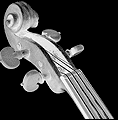

| Composer
John Adams: Thinking About Music in Our Time
Recognized as one of the most prominent and influential voices in contemporary art music, John Adams is also, by some estimates, America's most frequently performed living composer. With music that ranges from large orchestral pieces and opera to chamber music and compositions for electronic instruments, he is perhaps best known for such large-scale, proto-minimalist works as Shaker Loops and Harmonielehere.
But while the characteristic techniques of minimalism continue to
inform his work, it has evolved in such a highly personal way that
the minimalist label no longer fits.
Adams visited Oberlin in March in tandem with a performance of his
Naive and Sentimental Music by The
Cleveland Orchestra. His schedule included an afternoon of informal
conversation for Conservatory students and an evening program in
Finney Chapel as part of the College's 2000-01 Convocation Series.
During an engaging afternoon discussion (the choir room was packed
to overflowing), Adams focused on the craft of composition and on
his own philosophy and influences.
Born in 1947 to a family of musicians, Adams began studying composition
at the age of 10, eventually attending Harvard. After college, he
produced and conducted the San Francisco Symphony's "New and Unusual
Music" series. Today he maintains an active double role as a composer
and conductor and continues to be an outspoken advocate for contemporary
music.
Adams' presentation in Finney touched on some of the broad issues
in contemporary music, for example, the impulse behind the creative
process specifically, the elements required for a piece
to come into being.
Adams compared his own compositional process to that of a gardener,
whose primary tasks are to water and weed. Punctuating his talk
with recorded excerpts of his work, Adams gave an enthusiastic
Oberlin audience a unique opportunity to understand this growing
process.
-Kelsey
Cowger '02 Public
Forum Examines Composing for the Stage;
Opera Theater's Coyote Tales Gets Rave Review What does it takes to mount a theatrical musical production? That question was the focus of a public forum held on campus in November. From Page to Stage: Producing New Musical Works for the Stage served as an appropriate prelude to the Oberlin Opera Theater's November production of Henry Mollicone's Coyote Tales.
Sharing their experiences creating and producing new operas and musical works for the stage, the panelists responded to questions from Bamberger and the audience. Topics discussed included the challenge of balancing artistic expression and audience accessibility in composing new works, as well as the growing role of music schools and conservatories in performing the works of emerging composers. According to Mollicone, the music school role has become critical. "Music schools like Oberlin are a blessing in that they can produce very high-quality performances and arrange crucial productions after an opera's premiere that build its momentum." Mollicone served as guest conductor of the Oberlin Orchestra for Oberlin's production of Coyote Tales, his two-act opera based on Native American myths and legends, featur-ing a libretto by Harnick. Directed by Jonathon Field, assistant professor and director of opera theater, the production was described as "enchanting" by Donald Rosenberg, music critic for the Cleveland Plain Dealer. "Opera is not only alive and well at the Oberlin Conservatory, it's also adventurous," wrote Rosenberg. "The Oberlin Orchestra responds to Mollicone with playing of utmost point, sheen and spirit. Field's staging makes imaginative use of the space and his young singers, who move with whimsical grace as they create distinctive characters." -Charity Lofthouse '99 |
